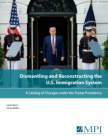Employment Verification
Recent Activity

An MPI Leadership Visions discussion with the Foreign Minister of Mexico, Claudia Ruiz-Massieu, for her first public appearance in Washington, DC.
The 10th annual Immigration Law and Policy Conference featured keynotes by U.S. Senator John McCain (R-AZ) and former Mississippi Governor Haley Barbour, as well as panel discussions covering a range of key immigration topics.
MPI experts participate in a video chat shortly after the Migration Policy Institute released an analysis comparing the major provisions of the Senate bill to those of the individual House bills considered to date in House committees.

MPI has released a major study that describes and analyzes today’s immigration enforcement programs, as they have developed and grown in the 25 years since IRCA launched the current enforcement era.

The conference offers thoughtful, evidence-based law and policy analysis and discussion of cutting-edge immigration issues.
Pages
Recent Activity
An effective electronic eligibility verification system is an essential component of the U.S. immigration system, but questions as to whether the E-Verify employment verification system should be made mandatory remain. This report examines the strengths and weaknesses of E-Verify, and discusses proposals for reform.
U.S. Citizenship and Immigration Services Director Alejandro Mayorkas details his agenda for his agency and discusses top priorities for USCIS.
This webinar examines the E-Verify system, offering short- and long-term recommendations for improving gaps in employment verification and addressing an "employer-centric" design that exacerbates existing problems.
This report provides an in-depth examination of the limitations of the existing E-Verify system. Alongside recommendations for strengthening E-Verify and mitigating its unintended consequences, the report offers proposals for three next-generation verification pilot concepts that would tap new technologies and practices to overcome the core weaknesses of the system.
Just a fraction of all U.S. employers use E-Verify, a federal system that checks potential employees' immigration status and their eligibility to work. MPI's Marc Rosenblum explores E-Verify's history, how it works, and the arguments for and against making it mandatory.
This report assesses the performance of the Department of Homeland Security (DHS) over the course of the agency’s first six years, examines the effectiveness of the three core immigration agencies within DHS—U.S Customs and Border Protection, U.S. Immigrations and Customs Enforcement, and U.S. Citizenship and Immigration Services.
This report looks at E-Verify, the Internet-based employment verification program operated by the Department of Homeland Security in partnership with the Social Security Administration. The program gives employers a means to electronically verify the work eligibility of newly hired employees.













